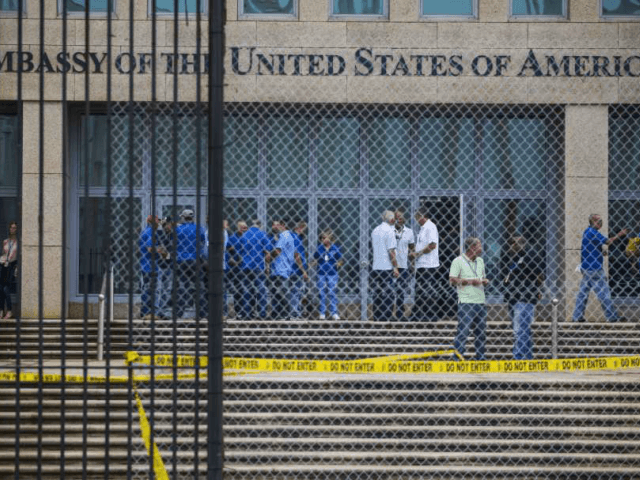Communist Cuban diplomats and state media outlets condemned the United States this week for withdrawing a significant percentage of its embassy staff from the island after a series of unexplained sonic attacks injured at least 21 diplomats and family members since November 2016.
Secretary of State Rex Tillerson announced in a statement Friday that the United States would withdraw non-essential staff from its embassy in Havana, which only recently reopened under former president Barack Obama. “Until the Government of Cuba can ensure the safety of our diplomats in Cuba, our Embassy will be reduced to emergency personnel in order to minimize the number of diplomats at risk of exposure to harm,” the statement read.
The State Department also warned all American citizens against traveling to Cuba.
Following the publication of his statement, the Cuban foreign ministry agency Minrex issued a statement calling the decision “hasty” and insisting that the Castro regime did not play a role in injuring the diplomats involved in the attacks.
The head of Minrex, diplomat Josefina Vidal, issued a statement calling the withdrawal of staff one of several “hasty decisions unsubstantiated by conclusive evidence and investigative results,” according to the communist propaganda outlet Granma. The newspaper adds that Vidal asserted that Cuba “has no responsibility whatsoever for the incidents alleged and seriously and rigorously abides by the obligations of the Vienna Convention … regarding protecting the integrity of foreign diplomatic officials accredited in Cuba and their families without exception.”
Cuban foreign minister Bruno Rodríguez spoke to Tillerson in an in-person meeting in Washington last week, asserting that there is no evidence for what happened to the nearly two dozen diplomats. The State Department classified that meeting—which occurred on Thursday, the day before the mass diplomat withdrawal—as “firm and frank,” while Granma provides details of what Rodríguez told Tillerson.
“Rodríguez Parrilla expressed that it would be lamentable that a matter of this nature be politicized and rushed decisions be taken without the support of evidence and conclusive investigative results,” Granma claimed, adding that Rodríguez protested the removal of Cuban embassy staff from Washington upon the initial revelation that American diplomats in Cuba had suffered attacks.
“According to preliminary results obtained by Cuban authorities in their investigation, which has taken into account data provided by authorities from the United States, until now there is no evidence regarding the causes and origin of the health conditions repored by American diplomats,” Rodríguez told Tillerson in that meeting.
The same report accuses “various figures of the anti-Cuban extreme right in Miami” as calling for shutting down the Cuban embassy. The only member of the “anti-Cuban extreme right” cited by name is Senator Marco Rubio (R-FL), a Cuban-American.
Granma dismisses evidence of a “sonic attack” as “lacking evidence and expert commentary” to defend it, despite the fact that reports have indicated an advanced acoustic weapon appears to have been used against U.S. diplomats since the story broke.
Cuban state media has been less measured in attacking the United States over the incidents. The Cuban communist newspaper Juventud Rebelde (“Rebellious Youth”), for example, published a piece accusing the Trump administration of “imprudence and irresponsibility” for withdrawing its diplomats, according to the Miami-based Martí Noticias. The article, titled “Backwards Without Reason,” argues that the Trump administration is “shining its hind lights on Cuba with imprudence and irresponsibility, looking for a clash with major damages” and accuses some in the administration of being “masters of the dirty games, lies, and reprisals.”
“Not even sideways like a crab—the Donald Trump administration seems to prefer moving backwards,” the article alleges, accusing Trump generally of “turning his back to international treaties.”
The Havana Tribune also published an article against the United States—and, again, Sen. Rubio in particular—this weekend. “With coarse and foolish pretexts, they are trying to block the development of relations, without caring about the prejudice they cause their population desirous of establishing mutually beneficial relations with the island,” the newspaper claims, apparently of American conservatives. Rubio earns a special mention for “his reactionary and stubborn positions regarding the island” (Rubio has called for limiting diplomatic relations with the Castro regime).
“We hope that the government of the U.S. will not continue to allow itself to be swindled by the nonsense accusations from the Miami mafia and their media disinformation campaigns,” the Tribune concludes. “They are a thousand light years away from the truth and reality of Cuba.”
Cuban former political prisoners have testified to being tortured with acoustic devices that have driven their cellmates to suicide, suggesting that Cuba may possess the technology necessary to conduct these attacks.

COMMENTS
Please let us know if you're having issues with commenting.